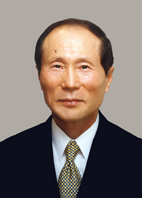people, fund
Moon-Soul Chung, chairman of the KAIST board of trustees, visited the building built with his donation on Monday (Oct. 19) for the first time since he made the deed of gift eight years ago, university authorities said on Monday (Oct. 19).
In 2000, Chung, founder and former CEO of Mirae Corp, manufacturer of semiconductor testing equipment, announced retirement and handed over the presidency of his company to one of his managing directors. One year later in 2001, he donated 30 billion won, then equivalent to $30 million, to KAIST. It was by then the largest amount given by a single donor.
The major part of his donation went to constructing a building for the newly-established Department of Bio and Brain Engineering, and it was named after him. However, Chung did not attend the ground-breaking and dedication ceremonies, saying that he would not enter the building until KAIST achieved a breakthrough technology which can inject a hope to Koreans.
On his first visit to the building, he was briefed on the major research outcomes of the department over the past seven years, which were highlighted by the recent invention of an apparatus for measuring perfusion rate of legs. A KAIST team headed by Prof. Chul-Hee Choi invented a light leakage prevention unit including a light emitting device for radiating light having a certain wavelength onto a living body injected with Indocyanine Green (ICG).
According to Prof. Choi, the invention relates to an apparatus for measuring the perfusion rate of legs. The invention also includes a light leakage prevention housing formed to prevent transmission of external light.
Chung expressing satisfaction with the achievements and encouraged professors, researchers and students working at the Moon-Soul Chung Building.

-
policy Minister of Higher Education of Saudi Arabia Visited KAIST to Sign Agreement on Joint Research Projects
Khaled bin Mohammad Al-Anqari, the Minister of Higher Education of Saudi Arabia, visited KAIST on October 26th to conclude a joint agreement with KAIST. The group of Saudi Arabian visitors included Abdullah bin Abdularhman Al-Othman, President of the King Saud University, Osama bin Sadiq Tayeb, President of King Abdulaziz University, and Khalid bin Salih Al-Sultan, President of the best Saudi Arabian technological university, King Fahad University of Petroleum and Minerals. Through res
2010-11-03 -
people Reasons for Hope: Jane Goodall Lectured at KAIST
Dr. Jane Goodall, globally acknowledged chimpanzee researcher and environmental activist, was invited to KAIST and gave a lecture on the importance of preservation and restoration of the ecosystem on the earth. The lecture took place on the 28 of September at the university’s auditorium from 5PM to 7PM. The lecture, titled “Reasons for Hope: Celebrating 50 Years of Chimpanzee Research,” was organized to celebrate her longtime career as a primatologist and anthropologist.
2010-09-29 -
people The CEO of the World's Largest Oil Company Visited KAIST.
Khalid A. Al-Falih, the Chief Executive Officer (CEO) of Saudi Aramco, an oil company owned by Saudi Arabia, the largest oil-producing country in the world, visited the KAIST campus on September 15, 2010. During his visit, Mr. Al-Falih was introduced to KAIST’s innovative projects such as On-Line Electric Vehicle, Mobile Harbor, and Hubo. Mr. Al-Falih was invited to the KAIST campus by President Suh, both of which are currently consultants for King Fahd University of Petroleum and
2010-09-17 -
people President of Israel visited KAIST on June 9, 2010.
President of Israel, Shimon Peres, visited KAIST today on June 9, 2010 to witness the development of science and technology in Korea and explore ways of establishing collaboration and cooperation with industries and universities between Korea and Israel. President Peres led a delegation consisted of the Israeli Mister of Industry, Trade, and Labor, the Minister of Communication, and 60 business leaders from the top companies in the security, infrastructure, communication, high-tech, and wate
2010-06-09 -
people Prime Minister Lars Løkke Rasmussen of the Kingdom of Denmark visited KAIST on March 11, 2010.
Prime Minister Lars Løkke Rasmussen of the Kingdom of Denmark visited KAIST on March 11, 2010. HUBO, a humanoid robotdeveloped by KAIST, gave a warm welcome to the prime minister and his delegation. Prime Minister Lars Løkke Rasmussen of Denmark visited Moon-Ji Campus of KAIST on March 11, 2010 and had a chance to meet a humanoid robot, HUBO. Since the first appearance in 2005, HUBO has been continuously developed by KAIST for further refinements. HUBO welcomed the
2010-03-17